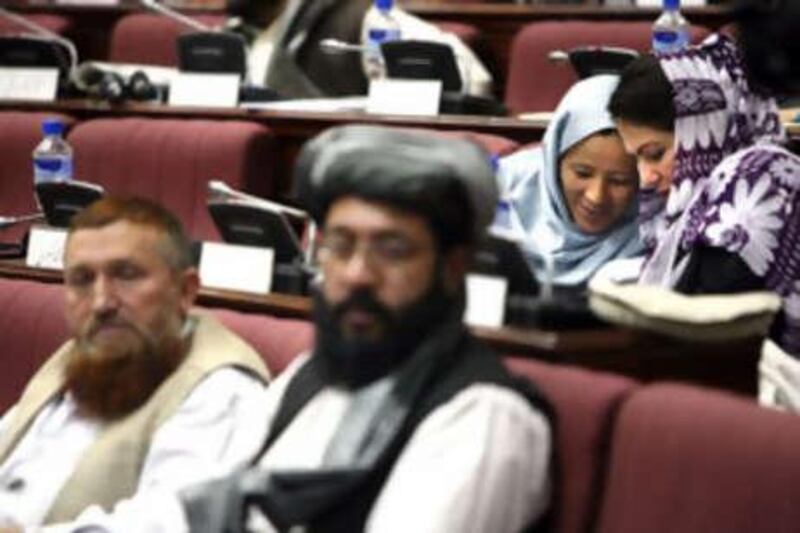A new United Nations report has revealed that a higher proportion of women are represented in several Middle Eastern governments than in their western counterparts. While the efforts of Hillary Clinton and Sarah Palin to break though the glass ceiling in the United States have garnered much of the media attention, women in Middle Eastern politics have been more quietly been making their own strides.
According to the UN report, Progress of the World's Women 2008/2009: Who Answers to Women? Gender and Accountability, in governments with a single chamber, or a lower house, 27.7 per cent of seats in Afghanistan are held by women, 25.5 per cent in Iraq and 22.5 per cent in the UAE. launched in the run-up to next-week's high level Millennium Development Goals (MDG) meeting at the United Nations General Assembly, it showed that the UAE has higher gender equality than the UK's 19.5 per cent, 16.8 per cent in the United States and 18.2 per cent in France. Nordic nations ranked higher, with 41 per cent of single or lower house seats occupied by women.
Compiled by the UN Development Fund for Women (Unifem), the findings show the improvements in some Middle Eastern countries in female representation; 10 years ago in Afghanistan, Yemen and Kuwait there was not one female politician in lower government.
"Gender equality is central to the achievement of the [Millennium Development Goals]," Ines Alberdi, executive director of Unifem, said. "Achievement of the MDG depends increasingly on women being able to ? participate in public decision-making at all levels."
Ms Alberdi said Unifem's evaluations show there is evidence not just of an accountability deficit, "but of promising government and civil society initiatives and institutional reforms that improve accountability to women". The report concluded that accountability to women "can require efforts to change gender-biased attitudes in public and private institutions". "This means much more than demonstrating the functional necessity of women's participation in politics ? Rather, it is about changing basic understandings of the public interest so that women's rights and gender equality are at the centre of social compacts for the broader good."
The 140-page document rated the UAE as among the most progressive Arab countries in terms of female political participation, highlighting the accession of nine women to the 40-seat Federal National Council following the Dec 2006 elections, and cabinet posts assigned to women during the March 2007 reshuffle. "The participation of women in the political life of the UAE is certainly a welcome thing and we would certainly like to see it replicated across the region," said Amr Nour, representative of the UN's regional commissions in New York.
"One of the functions of the UN's Economic and Social Commission for Western Asia (Escwa) is to promote the involvement of women in political life and policy-making in the Arab world." UN reports, however, have shown that women in the Arab world have limited access to education, especially at the secondary level, and that only 22 per cent of women of working age are employed. Achieving gender equality was one of the targets set by the UN in 2000, when world leaders signed the Millennium Declaration.
More than halfway through the venture's lifespan, the Arab MDGs report reveals that the UAE and other oil-rich Gulf states are likely to achieve most of their development goals by the target date of 2015. "Gulf Co-operation Council countries are on track to meeting the majority of the goals and this is a remarkable feat by any measure," said Asha-Rose Migiro, the UN's deputy secretary general. "Yet on the other hand, the least developed Arab countries, particularly those enduring conflict ? Iraq, [Palestinian territories] and Sudan ? are lagging significantly behind."
Dr Migiro described "regional solidarity" as a "key asset" of the Arab world, and called for greater co-operation between governments and the League of Arab States. pdriscoll@thenational.ae jreinl@thenational.ae





